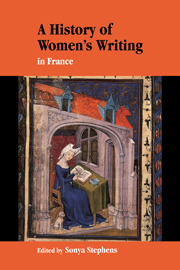Book contents
- Frontmatter
- Contents
- Notes on contributors
- Introduction
- 1 Female voices in convents, courts and households: the French Middle Ages
- 2 To choose ink and pen: French Renaissance women's writing
- 3 Altering the fabric of history: women's participation in the classical age
- 4 The eighteenth century: women writing, women learning
- 5 Eighteenth-century women novelists: genre and gender
- 6 The nineteenth century: shaping women
- 7 1900–1969: writing the void
- 8 From order to adventure: women's fiction since 1970
- 9 Changing the script: women writers and the rise of autobiography
- 10 Women poets of the twentieth century
- 11 Voicing the feminine: French women playwrights of the twentieth century
- 12 Feminist literary theory
- Bibliographies
- Index
11 - Voicing the feminine: French women playwrights of the twentieth century
Published online by Cambridge University Press: 25 September 2009
- Frontmatter
- Contents
- Notes on contributors
- Introduction
- 1 Female voices in convents, courts and households: the French Middle Ages
- 2 To choose ink and pen: French Renaissance women's writing
- 3 Altering the fabric of history: women's participation in the classical age
- 4 The eighteenth century: women writing, women learning
- 5 Eighteenth-century women novelists: genre and gender
- 6 The nineteenth century: shaping women
- 7 1900–1969: writing the void
- 8 From order to adventure: women's fiction since 1970
- 9 Changing the script: women writers and the rise of autobiography
- 10 Women poets of the twentieth century
- 11 Voicing the feminine: French women playwrights of the twentieth century
- 12 Feminist literary theory
- Bibliographies
- Index
Summary
The period 1871–1945 was a time of active acquisition of rights by women in France. The rise of militant feminism in France at the beginning of the century is paralleled by an increase in the number of women writing for the stage. French women dramatists in these early years of the century were principally writing socialist-feminist works that were read and/or produced in community halls and in Paris's universités populaires. The work of the bolshevik feminist, Vera Starkoff, and of the anarchist feminist Nelly Roussel (1878–1922) was produced in such Parisian locations between 1902 and 1908. In their plays they explored issues such as divorce, the woman's right to abortion and the mother's relation to authority within the family.
The first feminist theatre, the Théâtre Féministe founded in Paris in 1897 by Marya Cheliga, was emblematic of the growth of a strong feminist strand in new play-writing in France at the time. Theatre became a means for women to explore their socio-economic status and to voice their ideas in the public forum. While the more radical feminist–suffragist plays written in the early years of the century by women writers such as Séverine, Starkoff and Roussel were certainly read or performed in non-mainstream venues, by 1920 plays by women were being produced in all the main Parisian theatres.
- Type
- Chapter
- Information
- A History of Women's Writing in France , pp. 220 - 235Publisher: Cambridge University PressPrint publication year: 2000

